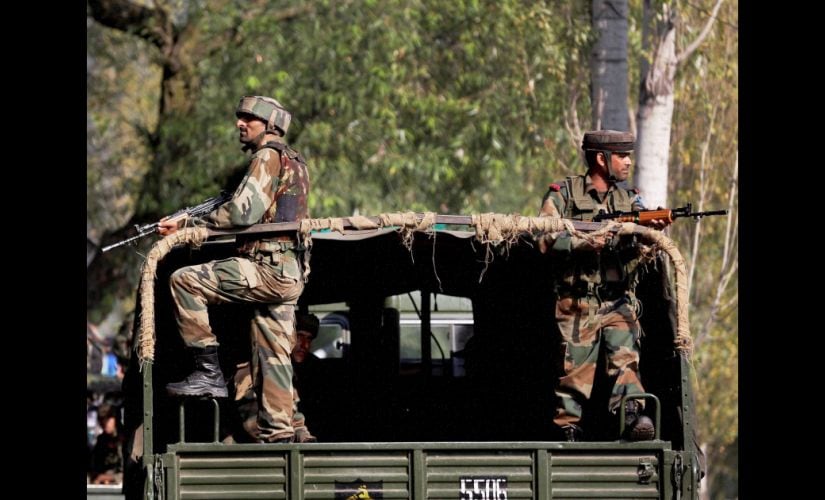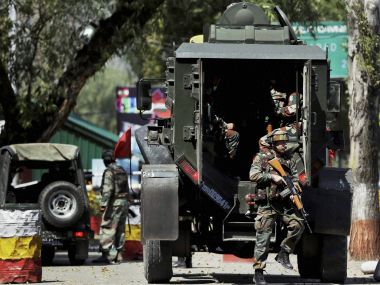The Uri attack dramatically drove home the fact that a very lethal sort of militancy will be a facet of the unrest that is unfolding now in Kashmir. Let us make no mistake: It is just beginning to unfold. The worst is yet to come. The training of the Uri attackers may have been similar to that of the 10 who attacked Mumbai in November 2008. If so, the facilities that produced them will surely produce more. This is not the sort of militant that was active during the 90s, not even in the very lethal phase of fidayeen attacks from 1999 to 2001. Those were easy by comparison. As for the sort of militants that Burhan Wani led, the Uri-type militants are as different from them as a global ring of nuclear device smugglers are from a neighbourhood gang of chain-snatchers. The government has done well to take the diplomatic offensive against Pakistan to a new level. But that will not stop Pakistan. Indeed, it might even spur it on. Far more important is policy-making on the ground — in Kashmir. Two kinds of action are very urgent: [caption id=“attachment_3013986” align=“alignnone” width=“825”] Soldiers guard outside the army base in Uri. PTI[/caption] Prepare on multiple fronts One, the army must pull up its socks. The Northern Command could soon face what smart strategists are calling ‘a two-and-a-half front conflict’ — the militants and stone-pelters on the ground together constituting just the half. This could very quickly transform into the biggest challenge any major army has faced since the Soviets were in Afghanistan. Uri gave a glimpse of just how quickly. The army’s smartest officers should immediately get involved in ops room war games, through which they might sort out which bridges and other vital infrastructure and installations need to be protected, what roads, railways and other lines need to be urgently upgraded, which supply lines need to be girded, and which fresh lines established. All three corps of the Northern Command should engage in this sort of brainstorming. Not only that, they should be prepared for the most unexpected possibilities on both the west and the east. We can only forget at our national peril how the Indian Army was taken by surprise in Kargil in 1999. Kashmir, not Pakistan Two, the government and the various organs of the State such as the army, must be very cautious now not to conflate the infiltrators of Uri with common Kashmiris. Sure, the infiltrators will get a huge and vital support from Kashmiri militants, and from stone-pelters too. But most of the latter will view the infiltrators as foreigners, never as their own. At least two strains of discourse have been common across Kashmir since the Uri attack. On the one hand, people are cynical about the whodunit. That is hardly surprising given the game of smoke and mirrors that the agencies have played in Kashmir for decades. But on the other hand, people are uneasy about this high voltage India-Pakistan action. For most Kashmiris, it was not part of the script. Azadi, autonomy, negotiations — these have all been part of the discourse in recent weeks. Kashmir becoming a part of Pakistan has not. It is not a generally preferred option. It may only be a coincidence that traffic has been relatively heavier in Srinagar since the Uri attack than over the past couple of months of continual hartal. Then again, it may not be a coincidence. In most parts of the valley, the forces have been relatively restrained over the past several weeks, noticeably more so than in 2010. In many cases, the forces have turned away from stone-pelting mobs, treating discretion as the better part of valour. It is imperative that the government keep a firm rein on the forces. They must not give up the gains of the policy of restraint. [caption id=“attachment_3013992” align=“alignnone” width=“825”]
Soldiers guard outside the army base in Uri. PTI[/caption] Prepare on multiple fronts One, the army must pull up its socks. The Northern Command could soon face what smart strategists are calling ‘a two-and-a-half front conflict’ — the militants and stone-pelters on the ground together constituting just the half. This could very quickly transform into the biggest challenge any major army has faced since the Soviets were in Afghanistan. Uri gave a glimpse of just how quickly. The army’s smartest officers should immediately get involved in ops room war games, through which they might sort out which bridges and other vital infrastructure and installations need to be protected, what roads, railways and other lines need to be urgently upgraded, which supply lines need to be girded, and which fresh lines established. All three corps of the Northern Command should engage in this sort of brainstorming. Not only that, they should be prepared for the most unexpected possibilities on both the west and the east. We can only forget at our national peril how the Indian Army was taken by surprise in Kargil in 1999. Kashmir, not Pakistan Two, the government and the various organs of the State such as the army, must be very cautious now not to conflate the infiltrators of Uri with common Kashmiris. Sure, the infiltrators will get a huge and vital support from Kashmiri militants, and from stone-pelters too. But most of the latter will view the infiltrators as foreigners, never as their own. At least two strains of discourse have been common across Kashmir since the Uri attack. On the one hand, people are cynical about the whodunit. That is hardly surprising given the game of smoke and mirrors that the agencies have played in Kashmir for decades. But on the other hand, people are uneasy about this high voltage India-Pakistan action. For most Kashmiris, it was not part of the script. Azadi, autonomy, negotiations — these have all been part of the discourse in recent weeks. Kashmir becoming a part of Pakistan has not. It is not a generally preferred option. It may only be a coincidence that traffic has been relatively heavier in Srinagar since the Uri attack than over the past couple of months of continual hartal. Then again, it may not be a coincidence. In most parts of the valley, the forces have been relatively restrained over the past several weeks, noticeably more so than in 2010. In many cases, the forces have turned away from stone-pelting mobs, treating discretion as the better part of valour. It is imperative that the government keep a firm rein on the forces. They must not give up the gains of the policy of restraint. [caption id=“attachment_3013992” align=“alignnone” width=“825”] Jawans stop people from entering Lal Chowk area in Srinagar. PTI[/caption] In for the long haul It is time the government and its organs woke up to the fact that we are in for a long haul. This unrest may dip for a while but there is going to be hell to pay over the next couple of years. It will be extremely tough to maintain restraint in place. Yet, the worst thing would be to treat the Kashmiri people by and large as the enemy, even when a large number of them will support and sustain lethal infiltrators. That is the mistake the Indian Army made in the late 1990s. Although that policy changed radically after Kargil, that mistake of the late 90s is one of the major reasons why we are witnessing a new insurgency. It must not be repeated. The last thing we need at this stage is stuff like Operation Calm Down, which was launched by no less than the army chief just about 10 days before the gentleman rushed back to the valley after the Uri attack. That’s not the sort of to-ing and fro-ing the army chief should be doing at such a challenging time. What is Operation Calm Down? It has put the army into play along with the police and the paramilitary to, um… yes, calm down stone-pelters. Bad idea. It stems from gross underestimation of the challenge that faces India. The urgency of getting our estimates of what we require from our army a little closer to right cannot be overemphasised.
Jawans stop people from entering Lal Chowk area in Srinagar. PTI[/caption] In for the long haul It is time the government and its organs woke up to the fact that we are in for a long haul. This unrest may dip for a while but there is going to be hell to pay over the next couple of years. It will be extremely tough to maintain restraint in place. Yet, the worst thing would be to treat the Kashmiri people by and large as the enemy, even when a large number of them will support and sustain lethal infiltrators. That is the mistake the Indian Army made in the late 1990s. Although that policy changed radically after Kargil, that mistake of the late 90s is one of the major reasons why we are witnessing a new insurgency. It must not be repeated. The last thing we need at this stage is stuff like Operation Calm Down, which was launched by no less than the army chief just about 10 days before the gentleman rushed back to the valley after the Uri attack. That’s not the sort of to-ing and fro-ing the army chief should be doing at such a challenging time. What is Operation Calm Down? It has put the army into play along with the police and the paramilitary to, um… yes, calm down stone-pelters. Bad idea. It stems from gross underestimation of the challenge that faces India. The urgency of getting our estimates of what we require from our army a little closer to right cannot be overemphasised.
David Devadas is an expert on politics and geopolitics. Formerly a Senior Fellow at the Nehru Memorial Museum and Library, Visiting Professor at Jamia Millia Islamia, and Political Editor of Business Standard, he is currently Distinguished Fellow at the Institute for Social Sciences. He has written books on Kashmir, on youth, and on history. He has been a radio compere, guest faculty at JNU's Academic Staff College, St Stephen's College and Hindu College. He has worked for the Indian Express, The Hindustan Times, India Today, The Economic Times and Gulf News. His most impactful article, on a murder cover-up, prevented a Congress President from becoming prime minister. One led to the closure of an airline, and another created a furore and consequent clean-up in Delhi's health department. Several have correctly predicted election results in key states, and a series of reports from Srinagar made the government aware of how unsettled the situation there was in 1990. He is an alumnus of St Xavier's School, St Stephen's College, and the Indian Institute of Mass Communication. He has lived for extended periods in Geneva and Berlin, and has traveled to almost 50 countries. He enjoys various kinds of music, theatre, design, architecture and art.
)